#twilight speculation
Explore tagged Tumblr posts
Text
My Analysis and Theories about Demetrius, Melinda, Donovan and Imperial Scholars
I hope you like reading because this is going to be a long one, I'm sorry. But I'm hoping to hear your ideas about these.
The Desmonds, aside Damian, are definitely weird, but I think there’s a high chance that Demetrius, alongside Melinda, was brainwashed and their minds are manipulated.

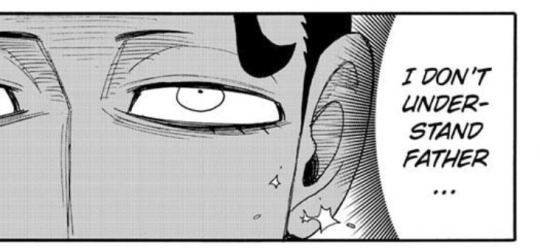
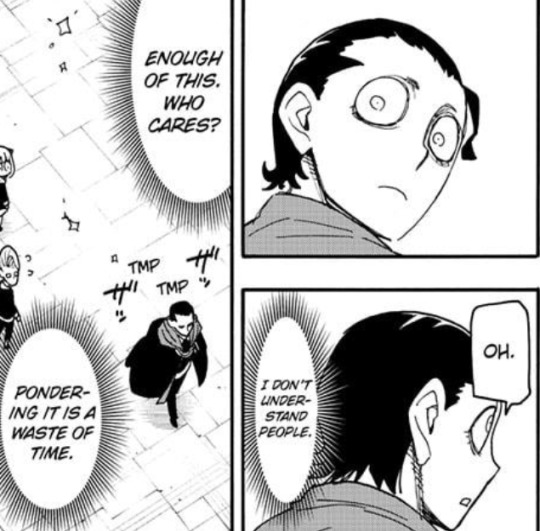
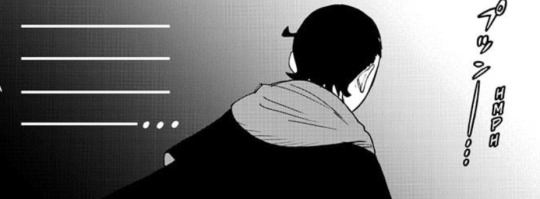
Demetrius seems to have empty thoughts aside from his constant belief that he doesn’t understand anyone, not even his brother and his father, despite spending a lot of time with him, as Damian stated. I think these thoughts have been instilled in him through brainwashing and mind manipulation.

That's likely the reason why Donovan spent a lot of time watching Demetrius when he was a child, forcing these ideas upon him since childhood.
This is the same idea he shared with Loid when they first met, that humans will never truly be sympathetic to each other because, at the end of the day, we are strangers, even to those who are our blood and flesh.
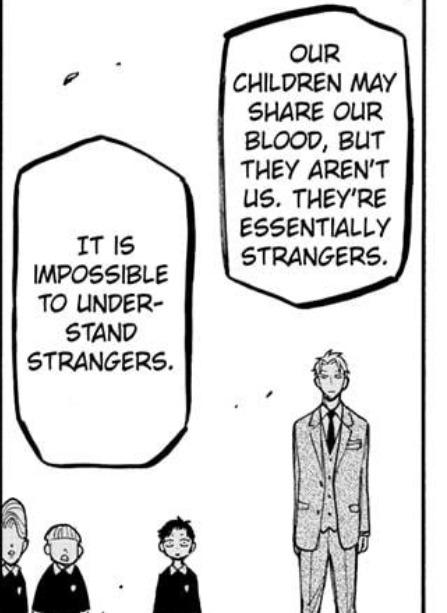

Melinda is the same too. Based on what we’ve seen of her so far, she seems to have conflicted feelings about Damian.
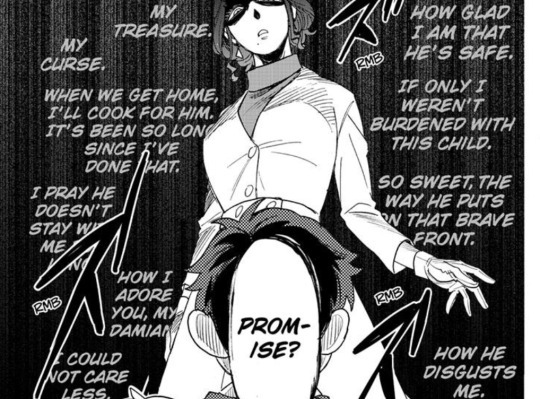
However, I think she was genuinely concerned for her son, but her husband is trying to instill those dreadful ideas onto her. (It might not be Donovan who was doing the mind manipulation, but based on the stitches on his head, there’s a possibility that he had been experimented on and had gained a mind ability somehow.)
I think that’s why she’s scared of Donovan knowing that she came for Damian at that school bus incident. Donovan doesn’t want her to care for anyone, not even their own sons (These poor kids).
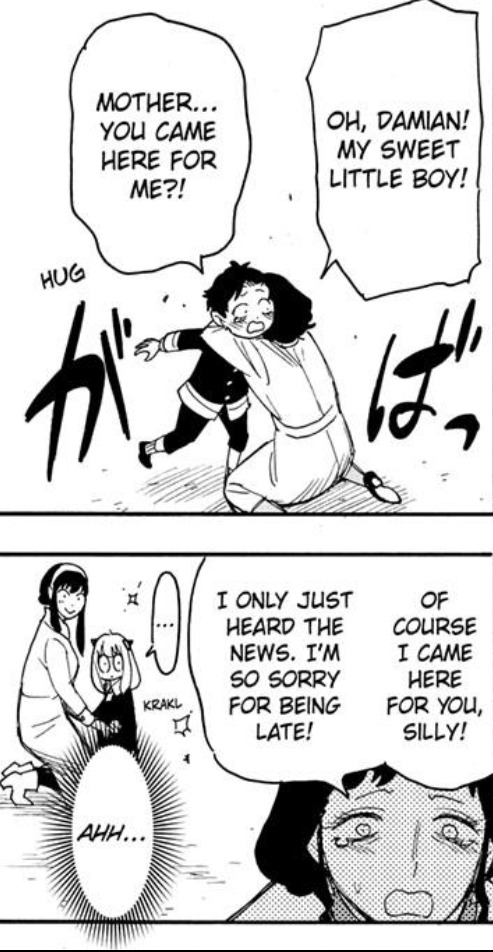
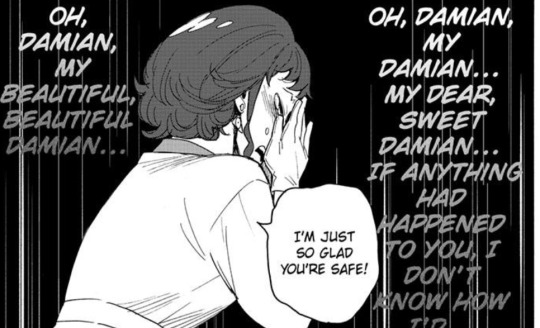
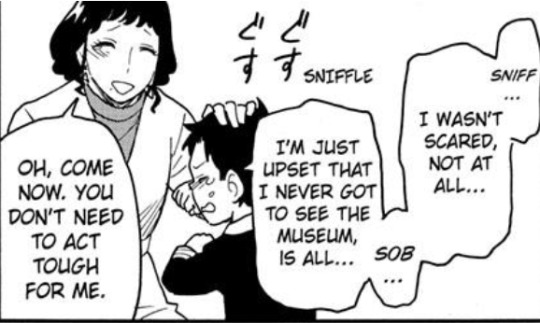

But I believe she truly wants to be a good mother, and she wants Damian to break the cycle going on in their family. (If she didn’t care, she wouldn’t race through Eden just to check on Damian’s safety at the bus arc.) And I think that’s the reason why she wanted Damian and Anya to be close, for Damian to have someone that would make him break out of the expectations he had set for himself and be finally free to be a child since it’s what her son deserved. (But still, this theory of mine still doesn’t make her not suspicious to me; right now, all I’m giving these newly introduced characters is the benefit of the doubt)
Why does Donovan want to instill these ideas that humans can’t truly understand each other, not even those who are family? Because that’s the reason wars happen—people not trying to understand one another. It occurs when they don’t strive to meet in the middle. Assuming he does indeed plan to wage war against Westalis, then instilling that idea would benefit him.
Of course, it’s hard to instill the same idea in every citizen in Ostania, especially when the current government is trying to establish a diplomatic relationship with Westalis. So, how could he encourage these ideas? Where are ideas usually taught? What establishment is so respected that these ideas would be very much welcomed and widely taught in a subtle manner, making individuals unaware that they are being influenced? Oh, right—educational establishments, schools, and universities. And which is the most prestigious school in Ostania that could assist in achieving this and influence the children of Ostania to acquire nationalistic ideas so that, in the future, they would carry these ideas for the sake of Ostania? Eden Academy.
This is where the hidden agenda of the Imperial Scholars, I think, plays out. Kids like Demetrius, I believe, are being brainwashed to adopt the same thoughts and ideas as Donovan. Children are the most vulnerable to manipulation, absorbing ideas like a sponge. That's my guess about what’s going on with these Imperial Scholars in Eden.
Why do you think they choose the cream of the crop among these students? The geniuses—won’t they be useful in terms of war? The other talented and athletic students could boost Ostania’s economy, and when they become famous celebrities, they could be influencers, shaping public opinion in line with the ideas they hold. The heroic and helpful ones could also be valuable in times of war, willingly risking their lives for Ostania.
When I was a Humanities student in my senior year of high school, I remembered studying a case in my country where athletes and geniuses were brainwashed by rebel groups into supporting their ideals regarding the government. In the end, these students did join those rebel groups, believing they were doing the right thing. They left their families, not even caring about their feelings, because they firmly believed that what they were doing needed to be done. They were first introduced into these societies or clubs, usually inviting geniuses and, take note, scholars. As they associated more with these clubs or organizations, they became more and more exposed and influenced. I can’t help but think that this could also be true in Eden Academy. I think this could be confirmed or debunked once we meet more Imperial Scholars or former Imperial Scholars and have their minds read by Anya. So for now, this is purely my speculation. But I'd like to know your ideas about it.
Operation Strix, I'd say, challenges Desmond’s ideas about people not understanding one another. Remember, Twilight’s goal was not to assassinate him; it was for him to determine if Desmond was engaged in any suspicious activities that might lead to war between East and West and to prevent it from happening. I think, in a way, Operation Strix could really achieve that because at its very core, it disproves Donovan’s ideas about people. These three individuals bound by Operation Strix, who barely knew each other and hadn't even spent a year together, have a lot of secrets and differences in terms of nationality, behavior, upbringing, and ideals. Yet, they managed to live peacefully as a family. They may not understand each other completely, but that doesn’t stop them from trying.
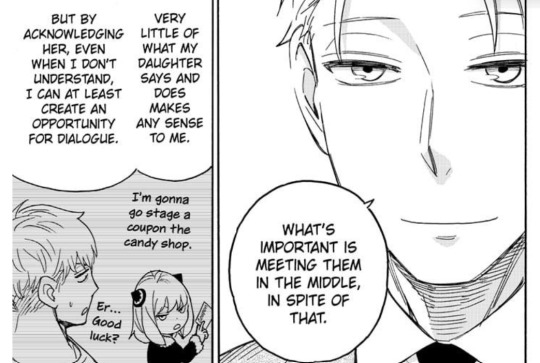
Twilight, despite Anya being a stranger to him, strives to always humor her no matter how weird her statements are. Even though he couldn’t fully understand her, he wanted to and he always tries to, because he’s not just a spy; he’s a parent, her father. That’s what parents and families do—they always try to understand one another. This connects back to the inside cover theory I talked about before, regarding the Forger family understanding one another.
It was fascinating to see how the Desmonds and the Forgers are alike in terms of being not a normal family but very different, especially in how they treat each other. I would love it if Donovan, as a character, symbolizes the idea of war, while Twilight and the family he built for his mission are a symbol of peace, proving it to be possible despite all differences.
What do you think about this?
#spy x family#spy x family manga#loid forger#spy x family anime#twilight#sxf anime#sxf manga#yor forger#anya forger#damian desmond#demetrius desmond#donovan desmond#melinda desmond#spy x family analysis#spy x family theory#sxf analysis#sxf theory#The imperial scholar one was completer speculation#But something was really shady about it#More mind abilities aside mind reading#I hope we can meet other more Imperial Scholars aside demetrius
467 notes
·
View notes
Text
Ok, so I can see the end of the chapter leading us three possible directions. Blame fanfiction for my wild imagination.
1) Anya's reveal to Damian was a one-off joke and he will continue to not believe her, the status quo is maintained and we get some more silly chapters unrelated to the reveal.
2) Anya now decides to just. Really convince him of her powers and we get some shenanigans, but still very silly. Maybe they get closer and maybe (as her backstory is being foreshadowed heavily) she even gets close enough to share with him how she got powers once he believes her. It's their secret now and it becomes a narrative foil for Twiyor with how having someone to confide in is good.
3) Due to all the foreshadowing of her backstory, I heavily suspect we may get Kidnapped!Anya. I'm probably living too much in fanfic land, but what if having revealed herself to someone has put her in danger and we get Twilight learning about her background and Damian being the only person she's told manages to give Twilight the info needed to rescue her? This also reaffirms for Twilight that keeping secrets are top priority and while he now knows Anya's, he's only more determined to close himself off for the sake of the mission, even if this also shows him just how much he cares for his (100% fake) daughter. This one is also my biggest stretch.
Anyway, just some thoughts!
#spy x family#sxf#spy x family spoilers#sxf spoilers#spy x family manga#sxf manga#spy x family speculation#sxf speculation#damian desmond#anya forger#damianya#sxf twilight#loid forger
290 notes
·
View notes
Text
Random thought - I can't help but wonder just how much Handler knows about what goes on with the Forgers and what she may have picked up on that Twilight may have missed
We know that she heard about Twilight collapsing after Anya got her second bolt

It's also all but confirmed that she knows about Nightfall's feelings for Twilight

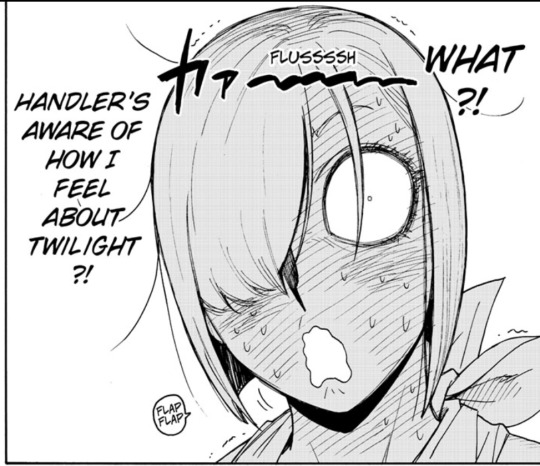
I can't help but wonder if she at least has a good guess about what was really going on with Yor during the bullet in butt date, even though she likely wouldn't know the exact nature of that injury or how Yor got it. I doubt she's guessed Anya's powers just yet, but depending on how much detail she has about how Anya reacted to certain things she may be able to guess that Anya has seen more shit than the typical modern orphan has and may end up being the least surprised when and if it gets revealed that Anya is a former lab rat
I'll admit that I'll be very surprised if she doesn't already realize just how attached Twilight is to the Anya and Yor, and likely realized that well before he did
#spy x family spoilers#if handler had bugged their living room Twilight would have found the bug by now right?#sxf spoilers#spy x family#sylvia sherwood#spy x family manga spoilers#spoilers#spy x family speculation#spy x family ramblings#loid forger#yor forger#anya forger
145 notes
·
View notes
Text



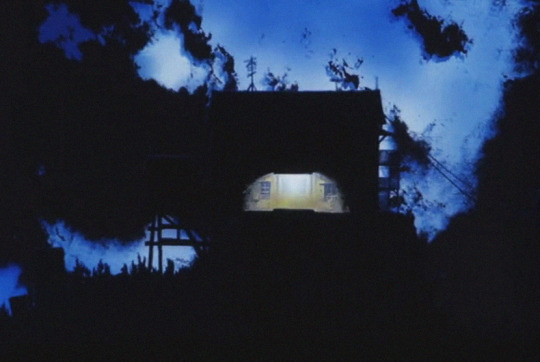
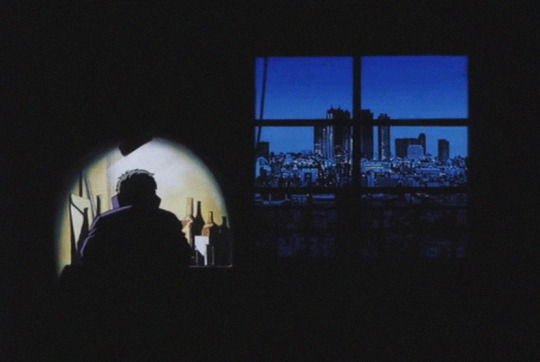



Twilight Q / トワイライトQ (1987)
segment: “Mystery Case — File 538 / 迷宮物件 File 538”
[letterboxd | imdb]
Director: Mamoru Oshii
Animation Director: Shinji Ōtsuka
Art Director: Hiromasa Ogura
Key Animators: Katsuya Kondō, Kitarō Kōsaka, Makiko Futaki, Masaaki Endō, Shinji Ōtsuka, Toshio Kawaguchi
Still Photographer: Haruhiko Higami
Studio: Studio DEEN
#1980s#1987#Twilight Q#Mamoru Oshii#Studio DEEN#animation#japanese animation#japanese film#my edits#anime#OVA#film#film stills#photography#speculative fiction#scifi#sci-fi
61 notes
·
View notes
Text
Would love to read a thesis on the shared settler-colonial mindset in Twilight and Twilight's cringefail gay knockoff, Wolfsong by TJ Klune.
#speculative fiction is my passion#everyone wants to talk about the sexism in Twilight well how about the colonialism#don't get it twisted I actually have read this kind of academic writing on Twilight#but nothing for Wolfsong huh?
26 notes
·
View notes
Text
Moonlight Serenade & Good Omens &... the TV show Lost...?
The music of Good Omens is something I have been ACTIVELY avoiding turning my focus on. The risks of hyperfixating and spiraling into it are HIGH. There are so many elements to get lost in, repeating motifs like Dies Irae, tolling bells, character themes... but I digress.
Could I hold out forever? no. and something finally pushed me over the edge. Wait for it..... Lost. Yep. The TV show Lost. WAIT WAIT, don't leave! STAY WITH ME! I promise I don't *think* I'm crazy and I have a point here!
Why Lost? And what does it have to do with Moonlight Serenade and WHAT DOES IT HAVE TO DO WITH GOOD OMENS?! Well my lovelies continue under the cut with me and keep an open mind...
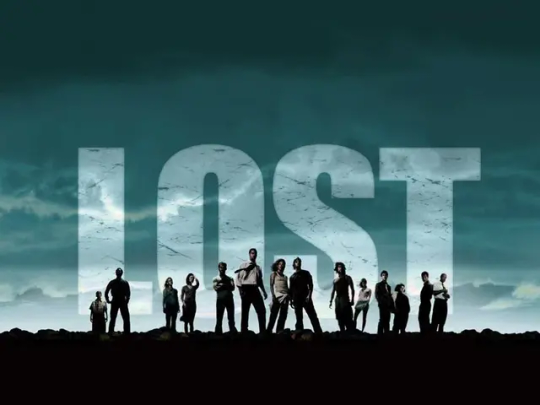
Okay so... Lost. Yes, the insane 2004 mystery plane crash island adventure drama. It's a wild ride, and a masterpiece and a little bit crazy, but overall pretty damn good. I've been on a rewatch spree and wouldn't you know it... parallels between lost and Good Omens popped up in my brain! I mean they are both intricate mysteries so it makes a tad bit of sense but there was one little detail that *might* be a *clue*, or just an easter egg if anything. I promise you don't need to know anything about Lost to follow this :)
First off, what are some of the recurring themes that Lost the TV show and Good Omens have in common you might ask?
Life & Death
Alternate timelines & Time Travel
Literary Allusions (Catch-22, The Bible, A Tale of Two Cities)
Prophecies & Premonitions
Symbolism of Black & White/ Light & Dark
Yeah okay that tracks, but look there are 121 episodes of Lost and 12 episodes (so far) of Good Omens so there's bound to be some overlap for these two.
You'll be thinking about now, "BUT WHAT DOES THIS HAVE TO DO WITH MOONLIGHT SERENADE?!" I'm getting there, shhh, lemme pet your hair gently and keep giving you background information to build it up shhhh...
If you've never seen Lost there is a very good chance you're mighty confused at this moment, so let me reassure you, you don't need to know anything about it to understand the connections I'm going to make. A brief synopsis is: Oceanic flight 815 crashes on an island. The plane crash survivors quickly discover the island is more than it seems to be and holds many secrets and mysteries. A lot of people die, most of them are murdered, it's giving Lord of the Flies if it was in the horror genre. That's honestly all you need to know.
Time Travel & Alternate Timelines
Time travel is cannon in Lost. It's super confusing and I'm not even going to try to explain any of it here. It's honestly just not worth it. If you'd like to try and read about it, the abridged version is here, but I don't think the details are important. Just know it's real and confirmed and exists.
Okay so, *SPOILERS FOR LOST WILL FOLLOW* In Lost season 2, episode 13 "The Long Con" two of the plane crash survivors are trying to find a signal on a radio they've found. While scrubbing they come across a signal playing Moonlight Serenade by Glenn Miller. One character mentions it must be from somewhere nearby, but the other counters that this type of radio can pick up signals from anywhere in the world. There is a beat and then another character jokingly adds "Or any time. Just kidding, dude."
It's later confirmed that the Lost characters in 2004 are indeed picking up a radio signal from 1940 that is playing Moonlight Serenade, a product of time travel.
Congratulations, you've made it to the point where I'm going to bring Good Omens into the mix. In season 2, episode 4 "The Hitchhiker" we open seeing Aziraphale driving back from Edinburgh late at night/early morning. Uncomfortable with the darkness and silence he asks the Bentley to "play something that's got a bit of swing? I'm in the mood for something modern."
The Bentley obliges the angel, as she always will, and we are shown a shot of the radio specifically lighting up, so we know she's tapped into the radio to play this for Azi, but there is no channel selected.

Compared to Season 2, Episode 3 "I Know Where I'm Going" when we see the radio is playing and does display the channel.

But hold on. Okay maybe it just isn't showing the channel, that's fine, but Aziraphale asked for "modern"? Moonlight Serenade is most certainly not modern. It was recorded in 1939! I'd say in 2023 it's anything but modern, maybe not in Aziraphale's long lived opinion, but certainly in the Bentley's opinion, given she's only a 97 year old car.
I think you can see now what I'm saying here. I think the Bentley picked up a radio signal from 1940, maybe 1941? Episode 4 is of course our 1941 blitz magic show bullet catch flashback extravaganza, so... it makes sense. I know we like to headcanon Crowley and Aziraphale listened to A Nightingale Sang in Berkeley Square in the bookshop in 1941 after the bullet catch, but what if they listened to Moonlight Serenade on the radio instead?
What does it mean?
A reference to this small moment from Lost could be a nod to the first hint of the canonization of time travel in that series. We know Crowley can control time to some extent and we can see some evidence of time discontinuities and possibly time weirdness in season 2 so is it a hint that timeline funkiness IS happening? Do I want to get into the fact that the main character in The Hitchhiker, the Twilight Zone episode this episode is named after, is actually dead? No I don't, not now anyway.
Or it's just an absolutely lovely little Lost easter egg.
SO! There it is... weird little connection that I couldn't get out of my brain. It just seemed a bit too... ineffable.
As always this is all for fun and all for fans! Don't ask Neil about these things, they're for us to have fun with. And something else that I don't think some people on here understand about meta-analysis; the goal of it is not necessarily to be correct. It can be, if that's your thing. Refuting peoples posts, theories, analysis, and headcanons because you personally don't agree with them and telling them they're wrong and stupid doesn't achieve anything. Meta-analysis is an exercise in critical thinking and creative writing. You could write meta about how Spongebob is a critique of the loss of christian values in modern society and you wouldn't be right or wrong, you'd just certainly be a person who wrote that for sure though. Just, be kind to each other, share ideas, you're allowed to disagree with someone's ideas or have different ones of your own but don't be cruel in saying so, don't call someone stupid, that's just silly.
Love you all, do something kind for yourself today <3
ps. The moment I see Michael Sheen with blonde hair come January I'm gonna bark like a dog, that's all. Thanks.
#good omens#good omens 2#good omens meta#aziraphale#crowley#michael sheen#david tennant#crowley x aziraphale#good omens theories#good omens clues#ineffable mystery#ineffable husbands#ineffable idiots#ineffable spouses#ineffable divorce#ineffable fandom#good omens fandom#good omens speculation#good omens theory#good omens analysis#good omens parallels#moonlight serenade#glenn miller#lost#oceanic flight 815#the twilight zone#the hitchhiker
108 notes
·
View notes
Text
Bychance, Vecna, Nosferatu, Vampires & Temptation
—
This is a response to this post by @offsidetracked:
—
EXCELLENT POST, and also:
"A big theme in Will's S5 arc is ✨TEMPTATION✨ Resisting it, giving in to it. And finding out the consequences of both."
Huge theme in The Phantom of the Opera (1910), Dracula (1897), Labyrinth (1986) & especially Nosferatu (1922). And many other works I'm sure.





It's no coincidence that Vecna 🦇 embodies the characters' trauma & is played by Jamie Campbell Bower—who played vampire Caius Volturi in Twilight, "one of the three ancient leaders of the Volturi, who are based in Volterra, Italy [...] Caius [...] is the most ruthless of the three leaders." (Twilight Saga Wiki)


TROPE: The "innocent" damsel being seduced by an older, lustful, hypnotizing, usually rich/powerful man (often a vampire 🧛♀️). A relationship which ultimately has the power to corrupt & destroy her.
We know that Chance/Jedediah is older, probably lustful (lol), hypnotizingly beautiful, & likely drives a cool car, which symbolizes material status.




(last pic by @ven0moir)
We’re approaching Will’s ✨material gworl✨ era, hence the s3 Max-El-Starcourt 🛍 connection to Taco Bell (Chance).
Will is waiting & Mike won't make a move!


Max & El are representative of different facets of Will's femininity. Taco Bell 🌮 is a reference to Chance probably being of Mexican origin. (For more info on this, check this post & this post.)
—
Bychance was always RIGHT THERE. 😭😭😭 Anyone who thinks this theory is "baseless" or "unlikely" has just been deluding themselves from the start.
🗝⸮₎₎⁾⁾⸝⁺⋆。゚⋆⸜﹒⋯﹒
To see more of my Bychance posts, click here -> BYCHANCE MASTERPOST.
#stranger things#will byers#mike wheeler#bychance#st5#st analysis#byler#chancegate#chance the jock#jedediah chance#st theory#stranger things 5#my post#cypherpost#vampiregate#phantom of the opera#dracula#labyrinth 1986#nosferatu#vecna#twilight#caius volturi#jamie campbell bower#st5 theory#st5 predictions#st5 speculation#st5 spoilers#max mayfield#el hopper#tacobellgate
16 notes
·
View notes
Text
With how intense Twilight's magical surge was when getting her cutie mark realistically, she would have scars from flying debris. With how strong the magic was, she could have completely burned off the fur on her horn completely and made her horn unable to grow fur back.
If you want to go to extremes she could have lost the horn completely if Celestia wasn't fast enough.
She was probably extremely exhausted from magical overuse and i wouldn't be surprised if they had her stay in the hospital for a few hours at least maybe even a dsy or two. A magic surge that strong for a kid that young is probably pretty serious and seriously taken. She probably had to wear a magic dampener of some kind during the first few months or even year of being taught magic by Celestia just out of precaution. And more for Twilight's physical health than anything. Magic that strong in such a small body is probably uncomfortable at least
#mlp speculation#speculation#drawing prompt#writing prompt#mlp fim headcanons#mlp headcanons#head canons#headcanons#head canon#headcanon#my little pony friendship is magic#mlp#alternate universe#mlp au#mlp fim#mlp alternate universe#mlp twilight sparkle#twilight sparkle#twilight sparkle#twilight sparkle mlp#my little pony friendship is magic twilight sparkle#my little pony twilight sparkle#mlp world building#mlp fim world building#worldbuilding#world building
101 notes
·
View notes
Text
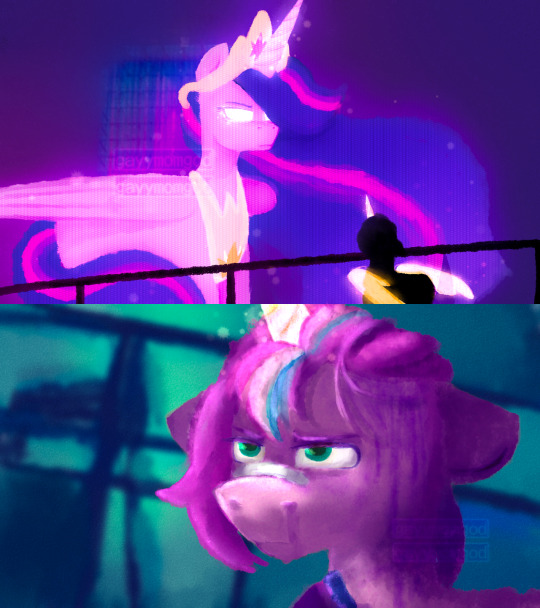
could you even become half of what she was
#mlp art#my little pony#my little pony g4#my little pony g5#mlp g4#mlp g5#twilight sparkle#sunny starscout#my little pony gen 4#my little pony gen 5#I really like both twilight and sunny#but sometimes I wonder if sunny ever feels like she’ll never be even close to what twilight was#like they’re both princesses of friendship#technically#so would sunny compare herself to twi?#would she feel like she’s even worthy of her alicorn magic?#idk!! Just silly thoughts I think about#I haven’t even watched the new gen5 shows so I’m just speculating#I’ve only watched the movie haha#bladerunner 2049#I’ve never watched bladerunner#LOL#esmé art
290 notes
·
View notes
Text
Alicorn magic.

#This is based of a mlp drama/grimdark me and a friend speculated#around the time the whole mlp infection thing was happening we made our own “Dark timeline”#It consisted of 3 “what if's ”#What if the villains teamed up sooner?#what is the elements of harmony where returned to the tree sooner?#and what if twilight rejected her alicorn form? requesting celestia “Take it back” but the deed was already done.#we never wrote it but it was neat#mlp#mlp g4#mlp fanart#mlp grimdark#Mlp twilight#mlp twilight sparkle#tw blood#I also wanted to try out pixel brushes :3
16 notes
·
View notes
Text
SPY X FAMILY - Character Relations Theory
Spoilers for SxF manga chapter 104 & 106 below the cut:
everyone good? okay
let's delve into the whom is secretly related to whom theories.
I suppose we've more or less heard of the Handler aka Sylvia Sherwood is Anya's long lost bio mom (or at least related) theory,
but have you considered:
Jeeves is somehow related to Twilight, who is originally [Redacted]?
I know it was shown in manga that [Redacted] doesn't have any bio siblings in his family, but what if there is a cousin 1 or 2 times removed or a half brother or long lost twin elsewhere?
both have blue eye color (wiki says Jeeves has dark blue, but I can't find a coloured version of Jeeves, so no guarantees yet *shrug*)
both have quick reflexes and combat skills
both are really good cooks (this guy made a gourmet dish in the middle of a forest; and Twilight under-covered as a world-class chef before)
both care a lot for children and are sometimes lenient on them
both have a over-the-top serious female subordinate
even the way they look to the side, or mannerism wise is rather similar *deja vu plays in the background*
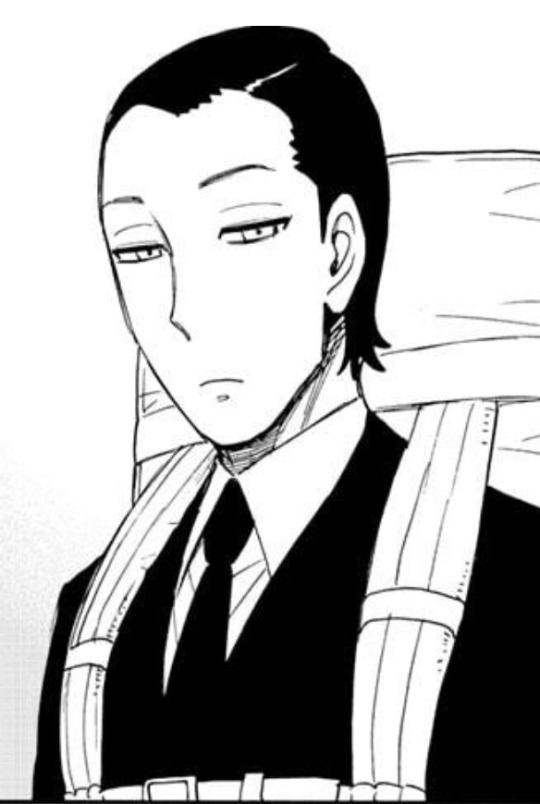
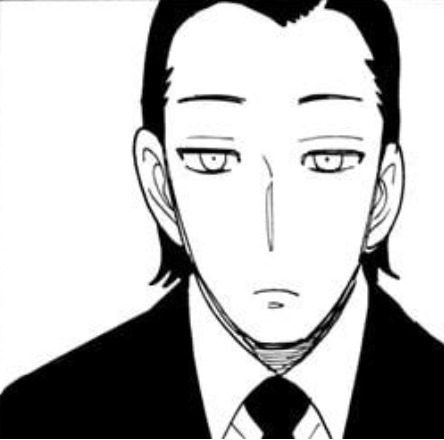
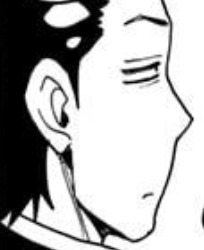

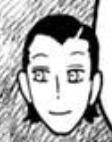
look me in the eye and tell me you haven't seen Loid/Twilight make these expressions before
I know some are really wide common ground for people in this story setting (e.g short reaction time and fighting skills from wartimes/occupational needs) and I might well be grasping at straws Endo put in for Foil comparison between the 2, but the similarities are uncanny
#sxf#spy x family#sxf manga#sxf spoilers#similarities similarities#loid forger#agent twilight#Jeeves aka the Desmond's butler#just speculations for now#granted his hair is not blond but at least that makes for the cousin once removed theory more plausible than others#I almost thought Twilight somehow sneaked into the Desmond family when I saw Jeeves#unless it was just to show Daiman has a brand of proper rapport from home which is similar to Loid's brand of caring#which explains why Daiman seems somewhat comfortable around Loid even upon first meeting back in end of s1#though#if this theory & another theory elsewhere where Melinda and Jeeves are related are both true#this would make [Redacted] Damian's uncle from his mother's side...#oh the irony that they reunited bcz of a mission called Strix#Character Relations Theory#sxf theories
18 notes
·
View notes
Text



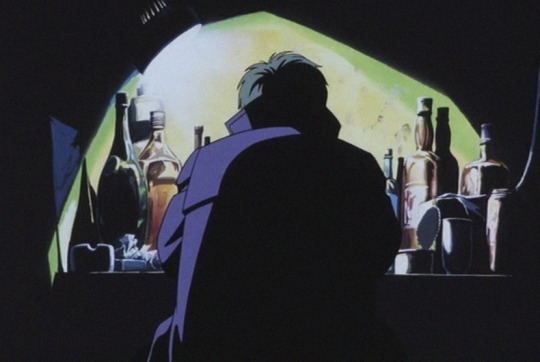

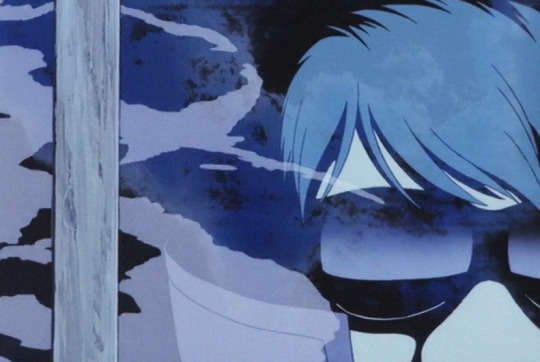
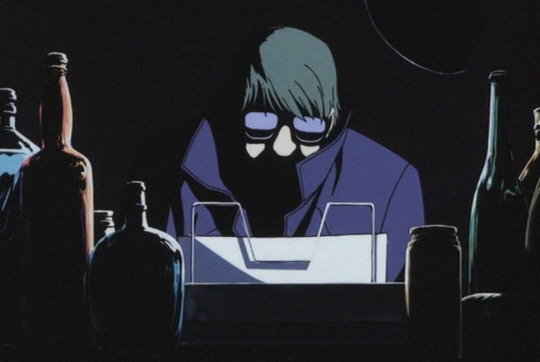

Twilight Q / トワイライトQ (1987)
segment: “Mystery Case — File 538 / 迷宮物件 File 538”
[letterboxd | imdb]
Director: Mamoru Oshii
Animation Director: Shinji Ōtsuka
Art Director: Hiromasa Ogura
Key Animators: Katsuya Kondō, Kitarō Kōsaka, Makiko Futaki, Masaaki Endō, Shinji Ōtsuka, Toshio Kawaguchi
Still Photographer: Haruhiko Higami
Studio: Studio DEEN
#1980s#1987#Twilight Q#Mamoru Oshii#Studio DEEN#animation#japanese animation#japanese film#my edits#anime#OVA#film#film stills#photography#speculative fiction#scifi#sci-fi
27 notes
·
View notes
Text
「93」
Can I just say that I'm still bothered by whatever this panel is foreshadowing?
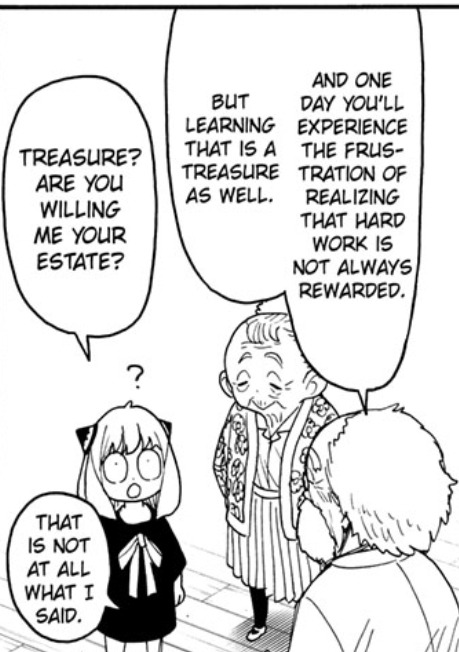
It could be foreshadowing that Anya is going to get put into a different class from her friends despite how hard she studied for her recent exams due to her low overall rank
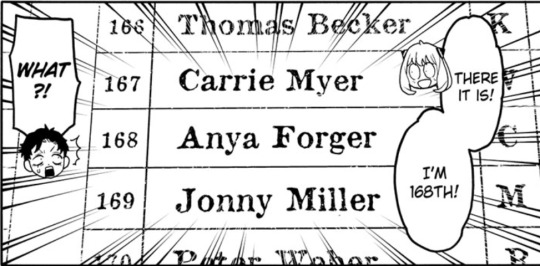
I could also see it possibly foreshadowing that Strix is ultimately going to fail* as well. We did get confirmation that Demetrius isn't close to his father either this chapter
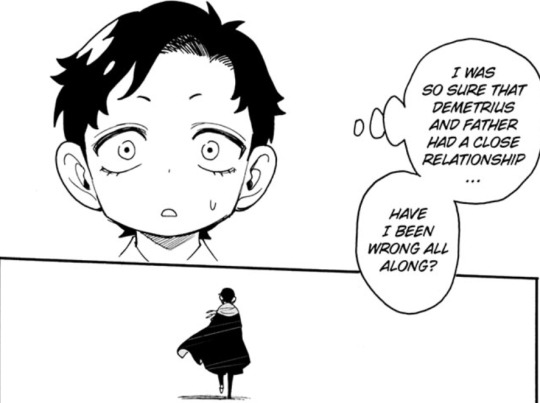
If Desmond isn't close to any members of his family, that may make it difficult to impossible for Loid to get closer to him so he can observe him for the mission by first getting close to a different member of his family, even if he manages to get access to Desmond via the Imperial Scholar events. That being said, I do think there's a chance that the Forgers will end helping the Desmonds to heal rifts in their family.
*I just want to say that I don't believe that Strix failing will automatically mean the end of the Forger family. More on that below.
WISE may find other uses for the family, such as gathering intel on other targets or serving as a bridge between them and Garden, or depending how his character arc goes Loid could insist on staying with the Forgers indefinitely. Given that Handler lost her husband and daughter, I have my doubts about her being willing to break up the Forgers, assuming she realizes just how attached they are to each other. Since she knows about Nightfall's crush, I suspect she has a good idea about what's actually going on with this supposedly fake family. One of my head cannons about Handler is that she is fighting for peace so that others don't have to lose their family like she did, which is probably a big part of the reason why I believe that she doesn't want to break up the Forgers.
#spy x family#handler can have a dog and Twilight can have a family#sxf spoilers#spy x family spoilers#spy x family manga spoilers#spoilers#spy x family speculation#loid forger#spy x family ramblings#anya forger#sylvia sherwood#spy x family headcanons#spy x family chapter 93#chapter 93#perhaps Garden will agree to work with WISE so long as they continue to provide cover for Thorn Princess or something
64 notes
·
View notes
Text
So I've been playing Twilight Princess. And in that game, there are six sages that all look like this:
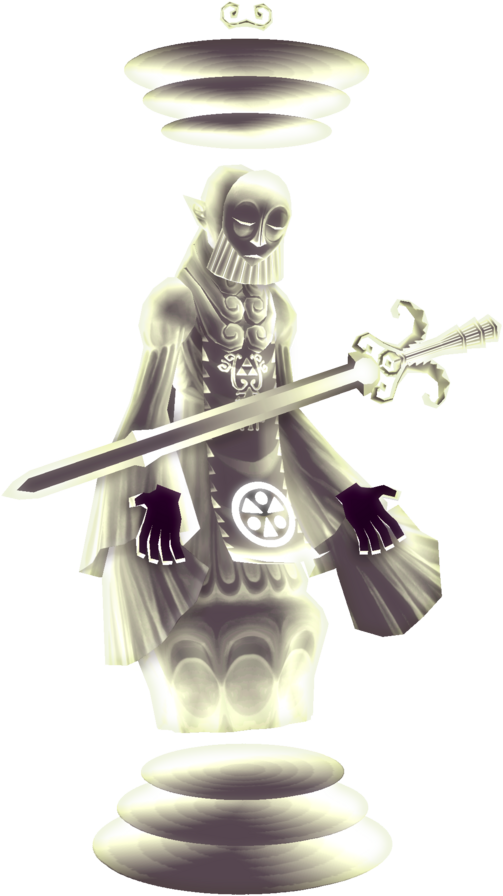
Yet these are meant to be very same sages from Ocarina of Time, before Ganondorf killed them. Which means that that guy above is actually Rauru.
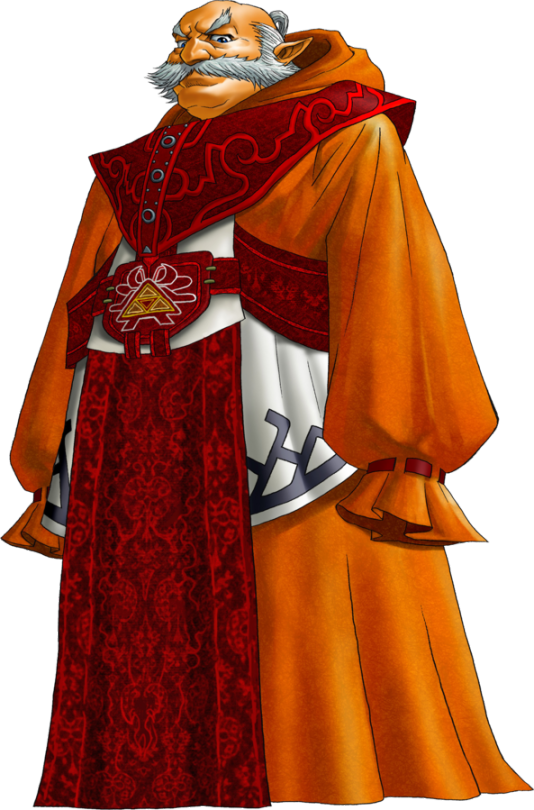
They look different because different people passed down different legends and warped them in different ways. And that gave me a thought: what if the Rauru in Tears of the Kingdom is actually the same Rauru from OoT again? And further, what if various things in the different games are actually the same? Like, there's a few different sky peoples across games; maybe they're actually the same sky people but different legends caused them to be depicted differently. Maybe the draconic hero from 10000 years ago is actually a Link we've played as.
#Legend of Zelda#Ocarina of Time#Twilight Princess#Tears of the Kingdom#many other things match up too#for instance: there are 6 sacred stones that give the sages their power#but i dont know enough about OoT to theorize much further#my post#speculation#actually the more i think about it the more i realize that last sentence is probably not correct#i dont think any other Zelda games have a bunch of hi-tech machines on our side
9 notes
·
View notes
Text
A small thing that's been bothering me a lot lately is the Spy x Family fandom assuming that Anya's an escaped test subject of Project Apple. It's true that the Scientists that experimented on Bond are the same ones that ran the lab Anya stayed in before meeting Twilight, but we were told that Project Apple was shut down shortly after the War ended, and one of the more recent chapters even says that some of the Scientists who worked on Project Apple together went off to conduct separate research after that Project ended.
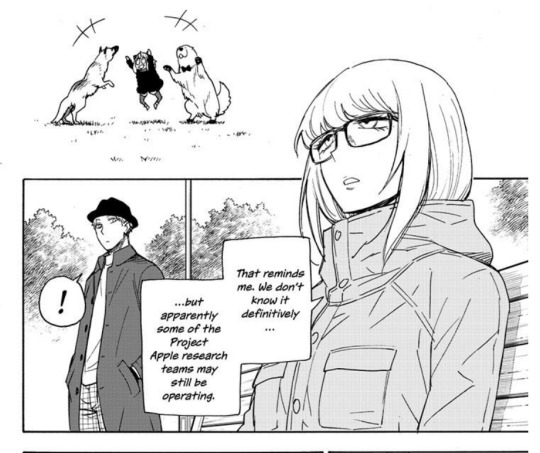
I genuinely don't think that the Experiment Anya's powers came from is Project Apple itself, but rather it's likely the result of a spin-off project. After all, Anya is SUPER paranoid about anyone learning about her powers:
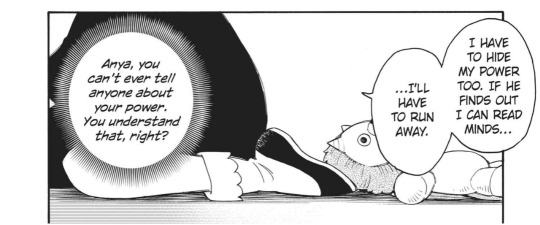


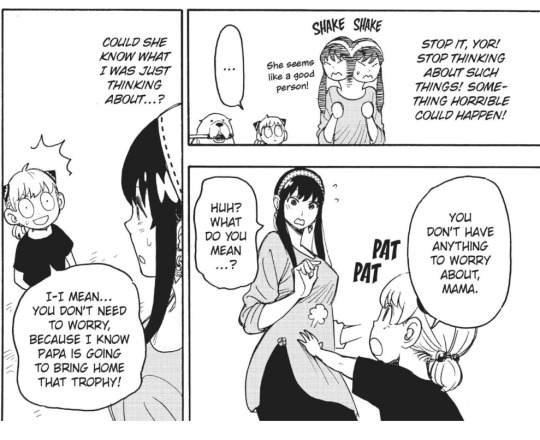
But has no reaction to Twilight and Handler discussing and thinking about Project Apple literally right in front of her.

I don't believe for a second that Anya can understand the concept of the Lunar Cycle and remembers the specific name that the scientists use to refer to its affect on her powers, but somehow doesn't know the name of the experiment she is a test subject of, or that she wouldn’t have a VERY visible reaction to those close to her becoming aware of that Experiment even on a surface level, whether or not they realize yet that she is the product of that Experiment.
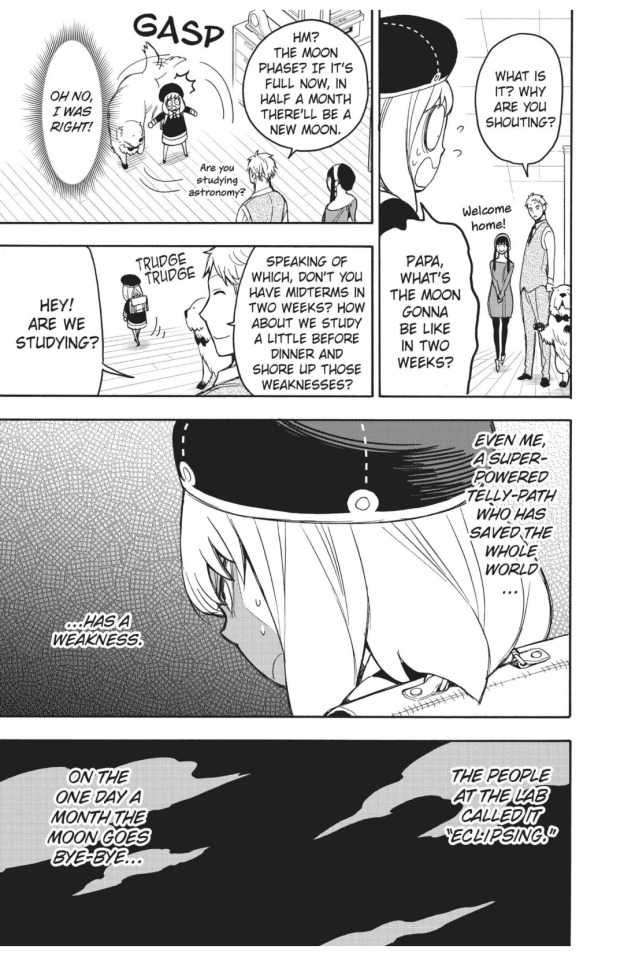
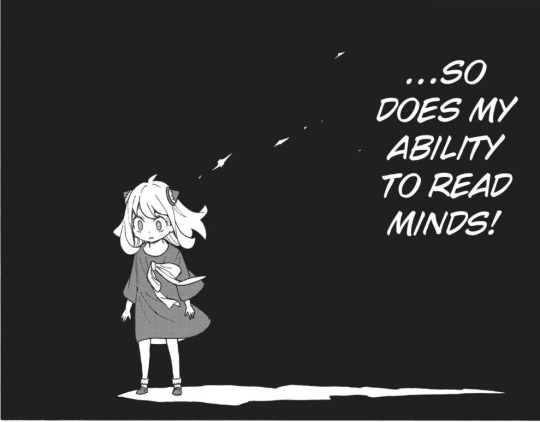
(WILD that this girl can't read a damn analog clock, but knows that there are two weeks between a full moon and a new moon...)
And there is also the Test Subject numbering to consider as well. Bond was Subject 008, and Anya was Subject 007. Bond was described as being a bit older for a dog (he was described as being 'long in the tooth' at his introduction, implying that he is a senior dog. Likely around 7 or 8 for a dog his size) and Anya is younger than she claims to be (4 or 5) so it doesn't make sense to think that they are test subjects for the same experiment and Bond is the subject that directly followed Anya. Perhaps the scientists reset the numbering when they moved from animal test subjects to humans, but if the animal test subjects showed no real signs of a reaction to the experiment, that jump seems unlikely and would probably be viewed as a waste of time, money, and resources, which was the entire reason the plug got pulled on Project Apple in the first place.
It's likely some of the things learned during Project Apple were refined and applied to the Experiment that gave Anya her powers, but looking at the facts I really don’t think it's still referred to as Project Apple by the time Anya gained her abilities.
#spy x family#spy x family spoilers#manga spoilers#anya forger#bond forger#loid forger#agent twilight#speculation#fan theories
122 notes
·
View notes
Text
SXF MANGA SPOILERS + speculation!
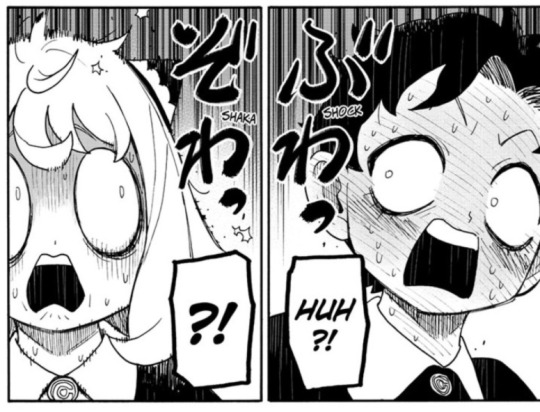

I wonder if this chapter and the one before it are setting things up for the future. The series has gone on long enough that there should be some kind of big shift happening, but nothing too big, since this series still has a lot of life left in it. (No twilight/thorn princess mutual reveals yet!). I now believe that Yuri and Damian are gonna be the ones to know the Forger family secrets first.
At this point, I think Damian is suspicious of Anya, and Yuri is obviously trying to find a way to arrest Loid, so he might figure out Loid’s secret along the way. That might set the stage for some twiyor, where Yor and Loid finally prove they are really “married” to Yuri. (After all, Yuri’s only seen failed attempts at kissing and spoon feeding, nothing of their real domestic life together). I don’t think it’d be Twiyor in the sense that they’d kiss or show physical affection, b/c I don’t think they’re there yet, but if Yor puts into words what she feels about Loid to Yuri, then Yuri would call off the arrest, like how Loid refused to finish Yuri off in the sewers. Or, Yuri bugs the apartment and overhears how happy Yor is with Loid, and calls off the arrest. Either way, parallels!!
On Damian and Anya’s side, I think Damian is smart enough to know something’s up with Anya. In the last chapter, when he thought about the implications of why Anya wanted to talk to him, Anya very obviously reacts to what he realized in his mind. He could justify it as Anya realizing the exact same thing that he did at the exact same time, but it seems to be a common thing that Endo does where one character comes to a huge realization, the narrative then jumps away to another character in the next chapter, and then jumps back to that character in the next as they’re milling over that huge realization. That may be happening with Damian, and in a future chapter, he’ll start thinking about all the times Anya has seemingly read his mind.
From there, I have no idea if Damian will ask Anya if she reads minds, or if Anya willingly tells him, or none of that happens. This just may be me wanting this to happen, but maybe Damian will enlist Anya’s help in figuring out his mom? And Anya tells him about how weird and contradictory her mind is? I think it’d be cool to see them figure out the mystery that is Melinda. She is so weird! I secretly hope she’ll be the “real” final boss, not Donovan Desmond. Like, wouldn’t it be cool if she’s the real mastermind behind the Desmond name?
Anyways, all this is speculation and none of this could happen, I’m sure. I do feel like there’s gonna be some big change coming, or another backstory (Yor’s hopefully!)
#spy x family#sxf#spy family#sxf manga#spy x family manga#sxf manga spoilers#twiyor#sxf loid#sxf anya#sxf yor#damian desmond#yuri briar#twilight#manga speculation!
123 notes
·
View notes